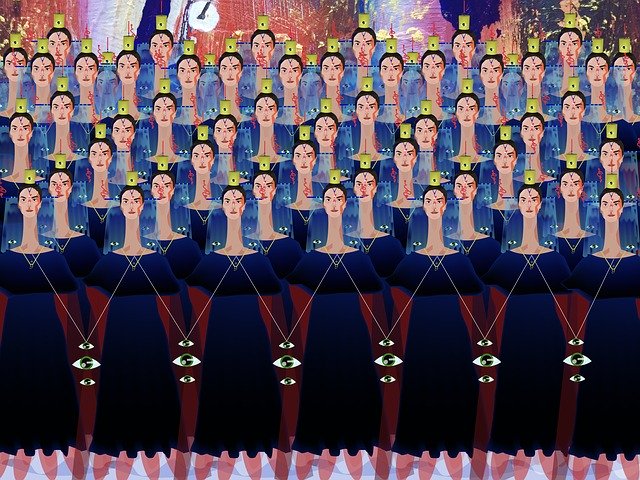 Submitted by Jacob Weiskopfh Ph.D on
Submitted by Jacob Weiskopfh Ph.D on
Good read worth share to aid in checking one's discernment level:
Does the universe suffer from multiple personalities disorder?
If there is something that really makes my bullshit detector go up to red alert when it comes to metaphysical claims is the increasingly popular idea of panpsychism.
There are a number of versions of it (we will encounter a couple below), but essentially the notion is that consciousness is not — as biologists and neuroscientists would understand it — a highly evolved trait present only in human beings and, to a lesser extent, in other species with sufficiently complex brains. On the contrary, panpsychists think that it is an elemental property of the universe, like mass, or the spin of a particle, and is therefore present everywhere.
Needless to say, there is not a shred of empirical evidence that panpsychism is a correct description of the world, and the notion, in modern metaphysics, is tightly linked to the solution of an entirely made up (in my opinion) problem in philosophy of mind: some philosophers, like my New York University colleague David Chalmers, just can’t imagine how a mass of meat, electrical signals and chemicals (i.e., your brain) can possibly produce the first-person experience we all commonly have when we see red (literally, as in the color), or experience sexual pleasure, or think and feel anything at all.
Chalmers calls this the “hard problem” of consciousness, and I have argued that there is no such thing. Consciousness has not, yet, been understood by science, but there is no reason in principle why it couldn’t. It’s “hard” only in the sense that it requires a hell of a lot of imaginative empirical work.
The fact is that people like Chalmers find themselves in a pickle. Since they maintain that consciousness is a problem irreducible to the methods of science, they have to postulate some sort of dualism, i.e., a radical, qualitative separation between what regular matter does and what thinking matter does. The most famous dualist was Descartes, who thought that there are actually two different kinds of matter: res extensa and res cogitans (this is called substance dualism).
This sort of dualism has gone, thankfully, out of fashion in philosophy, only to be replaced by a milder (but I think equally untenable, in the form in which it is usually presented) type, known as property dualism. Property dualists like Chalmers argue that when matter (the same matter, not two different kinds as hypothesized by Descartes) is organized in a certain complex manner, then consciousness somehow emerges. This is problematic because nobody seems to have a clue about what emergence means in this case, or how to cash it out as an actual explanation of consciousness. It’s sophisticated hand waving, but hand waving nonetheless.
Enter panpsychism. Chalmers and others have figured out that this very old notion (it is found in a number of cultures across the globe, for instance in Stoic philosophy in the West) can be couched in modern philo-scientific jargon and made to do the work to solve the hard problem. Indeed, for a panpsychist, in a sense, the hard problem dissolves into a non-problem, because consciousness does not have to emerge from certain organizational patterns of matter, since it is a foundational property of matter itself. It’s consciousness all the way down, so to speak.
The idea is elegant an appealing. And I assure you that, as a modern Stoic practitioner, I would love for it to be true! But it is ad hoc, meaning that the only reason to believe it, so far, is that it solves an artificial problem created by philosophers of mind themselves. There is no empirical evidence or independent theoretical support (say, from biology, or fundamental physics) for us to believe it.
Which is why we now turn to a recent essay by Bernardo Kastrup, Adam Crabtree, and Edward Kelley, entitled “Could multiple personality disorder explain life, the universe and everything?” Yeah, you read the title right (and did you notice the reference to the brilliant Hitchhiker’s Guide to the Galaxy?) The article, published over at the Scientific American blogs, is a lay summary of a technical paper that I honestly can’t believe passed peer review: The universe is consciousness, which appeared in the Journal of Consciousness Studies (David Chalmers is on the advisory editorial board, tough that doesn’t mean there is any direct connection between him and the paper).
Before I get to the crazy part of Kastrup and colleagues’ article, let me talk about the bits where I agree with the authors. First off, multiple personality disorder, or as it is now known, dissociative identity disorder (DID), is real, and these authors are credentialed experts in that field. I am, therefore, not questioning what they say about the disorder itself.
People affected by DID switch between a number of alternative personalities, each characterized by its own distinctive behavior. Recent research has shown that there are clear neural correlates to each “alter.” For instance, a woman with DID exhibited some alters that claimed to be blind, even though there was nothing wrong with her optic nerve or any other part of her visual system. Using EEGs, researchers were able to confirm that the component of the woman’s brain activity normally associated with sight was, in fact, not present whenever one of her blind alters was in control. By contrast, when a sighted alter reasserted control, the usual brain activity returned. So the phenomenon is real, with a clear and demonstrable biological underpinning.
I also agree with Kastrup and colleagues’ criticism of standard versions of panpsychism. Specifically, they call the sort of panpsychism I described above “constitutive panpsychism” and write:
“Constitutive panpsychism has a critical problem of its own: there is arguably no coherent, non-magical way in which lower-level subjective points of view — such as those of subatomic particles or neurons in the brain, if they have these points of view — could combine to form higher-level subjective points of view, such as yours and ours. This is called the combination problem and it appears just as insoluble as the hard problem of consciousness.”
Yup, exactly.
Kastrup and colleagues then move to something called “cosmopsychism,” which is the idea that consciousness is indeed spread throughout the universe, but it isn’t particulate (i.e., present in bits and pieces in particles, molecules, rocks, neurons, and so forth) but rather one whole thing. This is really the old fashioned philosophical notion of idealism: there is only one, universal, consciousness.
But cosmopsychism also is no slam dunk:
“You don’t need to be a philosopher to realize the obvious problem with this idea: people have private, separate fields of experience. We can’t normally read your thoughts and, presumably, neither can you read ours. Moreover, we are not normally aware of what’s going on across the universe and, presumably, neither are you. So, for idealism to be tenable, one must explain — at least in principle — how one universal consciousness gives rise to multiple, private but concurrently conscious centers of cognition, each with a distinct personality and sense of identity.”
I think you know where this is going, right? Let us have Kastrup and colleagues tell us explicitly:
“We know empirically from DID that consciousness can give rise to many operationally distinct centers of concurrent experience, each with its own personality and sense of identity. Therefore, if something analogous to DID happens at a universal level, the one universal consciousness could, as a result, give rise to many alters with private inner lives like yours and ours. As such, we may all be alters — dissociated personalities — of universal consciousness. Moreover, there is something dissociative processes look like in the brain of a patient with DID. So, if some form of universal-level DID happens, the alters of universal consciousness must also have an extrinsic appearance. We posit that this appearance is life itself: metabolizing organisms are simply what universal-level dissociative processes look like.”
Holy crap. So we are now positing that the entire universe “suffers” from a multiple personality disorder because we need to solve a non-problem that we created ourselves out of stubbornly postulating that there is something special and quasi-magical about consciousness. And of course, all of this without either a modicum of empirical evidence or any serious theoretical reason (again, from either biology or fundamental physics) to back it up!
(Moreover, if the universe were suffering from DID and I were one of the alters, shouldn’t I perceive myself as a coherent entity looking out to the whole universe, just like human DID patients see the world around them from a standpoint of unitary consciousness, no matter which alter is in control?)
No my friends. I think it far more reasonable to take consciousness at face value. It’s a biological process (like photosynthesis, say), that evolved in certain groups of the phylum Animalia (but not in plants, fungi, bacteria, and the like) with a sufficiently complex brain. We do not know how it works in detail, though we are beginning to map its neural correlates. We also don’t know why consciousness was favored by natural selection (we infer that it must have been because the necessary brain structures are metabolically very costly), though there are hypotheses out there (it may have to do with our ability to create mental representations).
Let me be clear about one thing here: panpsychism, property dualism, and even substance dualism aren’t crazy ideas. They are not logically inconsistent or anything like that. But they are not consistent with everything we know from the natural sciences at this point. And if I have to choose between that knowledge and made up notions like the ones we have considered here, I’m whipping up my Occam razor and mercilessly slash through the whole shebang. At this point in time, the razor will surely cut down panpsychism. In the future, we’ll see, fate permitting.
Massimo Pigliucci
Posted for educational/philosophcal theoretical purposes only.
- 455 reads
